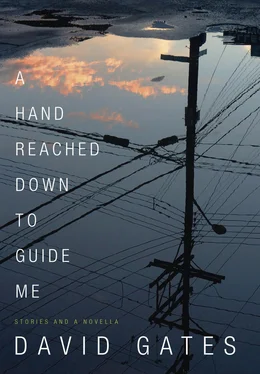David Gates - A Hand Reached Down to Guide Me
Здесь есть возможность читать онлайн «David Gates - A Hand Reached Down to Guide Me» весь текст электронной книги совершенно бесплатно (целиком полную версию без сокращений). В некоторых случаях можно слушать аудио, скачать через торрент в формате fb2 и присутствует краткое содержание. Жанр: Современная проза, на английском языке. Описание произведения, (предисловие) а так же отзывы посетителей доступны на портале библиотеки ЛибКат.
- Название:A Hand Reached Down to Guide Me
- Автор:
- Жанр:
- Год:неизвестен
- ISBN:нет данных
- Рейтинг книги:5 / 5. Голосов: 1
-
Избранное:Добавить в избранное
- Отзывы:
-
Ваша оценка:
- 100
- 1
- 2
- 3
- 4
- 5
A Hand Reached Down to Guide Me: краткое содержание, описание и аннотация
Предлагаем к чтению аннотацию, описание, краткое содержание или предисловие (зависит от того, что написал сам автор книги «A Hand Reached Down to Guide Me»). Если вы не нашли необходимую информацию о книге — напишите в комментариях, мы постараемся отыскать её.
magazine anointed “a true heir to both Raymond Carver and John Cheever.”
A Hand Reached Down to Guide Me Relentlessly inventive, alternately hilarious and tragic, always moving, this book proves yet again that Gates is one of our most talented, witty and emotionally intelligent writers.
A Hand Reached Down to Guide Me — читать онлайн бесплатно полную книгу (весь текст) целиком
Ниже представлен текст книги, разбитый по страницам. Система сохранения места последней прочитанной страницы, позволяет с удобством читать онлайн бесплатно книгу «A Hand Reached Down to Guide Me», без необходимости каждый раз заново искать на чём Вы остановились. Поставьте закладку, и сможете в любой момент перейти на страницу, на которой закончили чтение.
Интервал:
Закладка:
When she gets out of the car, the white shirt seems to glow in the dimness, so she takes it off, her jeans too, and walks, naked, through the trees, on merciful pine needles, to where she can see water, a dock, a cottage with lights on. She looks right, looks left, then leaves the cover of the pines and tiptoes toward the grassy bank. These people won’t spot her: she’s been gifted with invisibility. Only the dead can see her nakedness, and haven’t they been watching all along? She steps onto the moss at the edge of the bank—its softness feels green—and into the weeds and water. Her feet sink to the ankles in muck. It’ll be warmer once she gets in. She wades till the water’s up to mid-thigh, leans forward and launches herself.
It’s as close to flying as we get in this world: breast-stroking through this uncanny element midway between earth and air, your legs extended behind you, your feet touching nothing. She swims out until she’s breathing hard, turns, treads water and looks back. The lights are on in the cottages, and here and there on the shore she can see tiny people clustering around the flames of outdoor grills. The stars are coming out, and the voices from far across the water are pinpricks in the silence. Her heart’s slowing again, she’s catching her breath. She treads water, floats awhile on her back, then treads water, then floats awhile. You could do this forever—or until you see the way that leads on from here, or until the dead speak to you at last.
Alcorian A-1949

The man who built this house—Royall Brown, 1750–1797—is buried in the graveyard up across the road, along with his wife, his son and his son’s wife and children. I’ve outlived him, at least in the sense that he was forty-seven and I’m now sixty-one. He built it in 1790, so I’ve occupied his house longer, too—unless you believe the lady we bought it from, who told Deborah she used to hear his ghost. Bring your drink out to the porch. You can see his headstone up there, the one with the top carved in the shape of wings.
The year we moved here, Deborah did a rubbing and had it framed for my fortieth birthday, his epitaph in forward-slanting script: Dear Christian Friend, as here you stand / Thy Flesh is dust, thy Time is Sand . We were ironists but we weren’t—does that contextualize it for you? He the still-promising composer and sometime pianist who had studied with Morton Feldman; she the once-promising mezzo, pregnant with a last-chance child who was to be raised in clean air, among woods and white clapboard houses, where the wicked cease to trouble. Royall Brown’s epitaph sang to me, as words sometimes will even now, in a darksome, twisty melody, which I put through the grinder—inversion, retrograde, retrograde inversion—and set for baritone and cello. You’ve heard that old Library of Congress recording of Golden P. Harris singing “I’ll Lead a Christian Life”? Well of course you haven’t, but that was the mood I wanted, though if you were to hear my piece—and there’s an if —it would just sound like good old dentist’s-chair serialism. Wasn’t I the shit back then? I must still have it on reel-to-reel somewhere, performed by colleagues at a faculty recital.
Mrs. Gartner, who’d heard the ghost, lived on here after her husband died, despite macular degeneration and incipient dementia. When she finally fell and lay at the foot of the stairs for a day and a night, her granddaughter got her into Merrivale, the nursing home here in town—so her friends could still visit, in theory—and put the house on the market. But the lady signed the papers herself, God bless her, in the solarium, a lighted magnifying glass in her other hand, with the granddaughter standing beside her wheelchair. Then she clutched Deborah’s wrist and said, “You won’t forget me now?” Deborah and I took the girl to lunch afterward, though I shouldn’t say “girl”; she looked to be in her mid-twenties. She told us her grandparents had raised her—no explanation given—and that she’d lived in the house from when she was six until she went off to UNH. She had chopped-off black hair, black nail polish and black tights that showed white flesh through their ladders. Her name was Jessamyn. I’ll omit all that the male gaze registered, but isn’t it always a question of would you or wouldn’t you? Deborah (though she’d seen me looking and surely knew I would) told her to stop by anytime she came to see her grandmother. But we never heard from her.
Deborah took to visiting Mrs. Gartner once a week. Mrs. Gartner would ask if hummingbirds still visited the feeders she’d put up—of course Deborah said they did—and if the swallows still made nests in the corner of the porch, which was true. She would bring roses from the garden (the old lady could smell them, at least) and stewed rhubarb from the plant in the side yard. Deborah got stories about the Gartners’ courtship—he used to bring her blueberries he’d picked, in a Maxwell House coffee can—but she could never find out how they had come to raise the granddaughter. “Children can be such a disappointment”: that was all the old lady would say. A few times, at her request, Deborah went over to sing, in what the nurses were instructed to call the living room, and she roped me in to accompany her, on an old Chickering upright. For conservatory types, we were convincing enough: I’d worked my way through Buffalo playing lounges, and Deborah could sing “My Old Flame” or “Someone to Watch Over Me” without sounding like a lieder-trilling twit. After Sophia was born, Deborah brought her along a couple of times, but Mrs. Gartner got “agitated,” as the nurses put it, when Deborah took the baby away, thinking it was her baby.
Demented though she may have been, Mrs. Gartner had kept her mouth shut about Royall Brown until after we’d closed on the house. Deborah asked her how she’d known it was his ghost, and she said, “Why, who else would care?” Before Mr. Gartner’s heart attack, he’d been trying to talk her into moving to Florida.
Deborah began hearing Royall Brown, too: a floor creaking somewhere as we lay in bed, a door slamming, a thump outside, the faintest ping from my piano down in the living room. Never anything that might not have been a gust of wind, or the house settling, or an apple falling from one of the old trees I never got around to pruning—we used to talk about buying a cider press—or a wasp lighting on a piano string. Or, in the fullness of time, Sophia sneaking out to buy drugs. Deborah once saw a patch of fog over his grave in the shape of a man, but it dissipated by the time I could get out to the porch. His presence, she told me, felt “disapproving.” I made my will a couple of months ago, and it specifies that my body be cremated, so I won’t be joining the cast of characters up across the road. Or my own mother and father, buried in the town in Massachusetts where I grew up, seventy miles from here as the spirit flies. And I doubt that my own spirit—if I have such a thing, if I am such a thing—will be mooning around the house, rattling windows and wringing its see-through hands over, say, having failed to love when it was still possible.
Deborah had clearly worked up her farewell aria with some care: she would never have a career now, she told me, but at least she might have a life (this was a false ending), and (here comes the final cadence) she never wanted to see this place again. Come Judgment Day, they’ll confront me with a pie chart, showing just what percentage of me wanted this. So I’ve left the house to Sophia—who, when the time comes, might be more sentimental than she is now and unwilling to sell off her childhood home, from which she ran away for good at sixteen. She’s twenty-two, has apparently straightened herself out and lives with a boy in Berlin; if I’m accurately intuiting my own trajectory, she’ll inherit this place when she’s about thirty. By which time I will have done my important work—you understand that’s a joke, yes?—and the world (if I’m accurately intuiting its trajectory) will be shot to hell too, and she might be glad of a refuge—for however long such a refuge will last—twenty miles off the nearest interstate, where you can still sit and drink on the porch of a white clapboard house.
Читать дальшеИнтервал:
Закладка:
Похожие книги на «A Hand Reached Down to Guide Me»
Представляем Вашему вниманию похожие книги на «A Hand Reached Down to Guide Me» списком для выбора. Мы отобрали схожую по названию и смыслу литературу в надежде предоставить читателям больше вариантов отыскать новые, интересные, ещё непрочитанные произведения.
Обсуждение, отзывы о книге «A Hand Reached Down to Guide Me» и просто собственные мнения читателей. Оставьте ваши комментарии, напишите, что Вы думаете о произведении, его смысле или главных героях. Укажите что конкретно понравилось, а что нет, и почему Вы так считаете.











